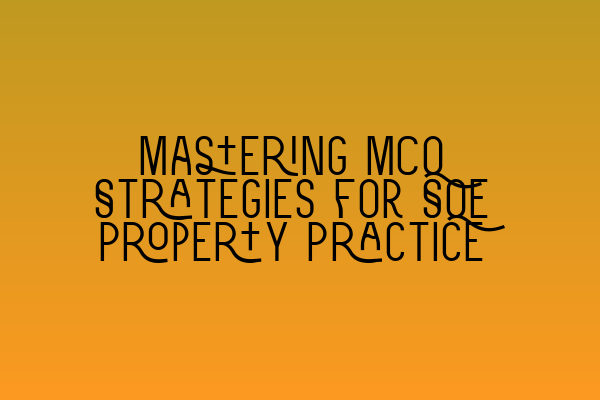Mastering MCQ Strategies for SQE Property Practice
As an aspiring property lawyer, mastering multiple-choice question (MCQ) strategies is essential for success in the Solicitors Qualifying Examination (SQE). The ability to quickly and accurately answer MCQs is crucial, as this exam format is used extensively in both SQE 1 and SQE 2. In this blog post, we will explore effective MCQ strategies specifically tailored for SQE property practice.
1. Understand the Structure of SQE Property MCQs
SQE property MCQs are designed to test your knowledge and understanding of property law principles and their application in practical scenarios. It is important to familiarize yourself with the structure and format of these questions before attempting them. Take advantage of practice exams and mocks available online, such as the SQE 1 Practice Exam Questions and Practice Mocks FLK1 FLK2, which provide valuable exposure to the types of questions you can expect.
2. Read the Question Carefully
One of the common pitfalls in MCQ exams is not paying close attention to the question. Make sure you read each question carefully and understand what it is asking before selecting an answer. Look out for keywords that can give you clues about the correct response. Take your time, don’t rush, and avoid making assumptions.
3. Analyze the available Choices
Once you have understood the question, analyze the available choices. Often, you will find that some choices offer obvious incorrect answers. Narrow down your options by eliminating these choices. This technique increases your chances of selecting the correct answer.
4. Apply Legal Reasoning and Knowledge
SQE property MCQs require you to apply your legal reasoning skills and knowledge. Use your understanding of property law principles to assess the given scenario and determine the most appropriate answer. Remember, the SQE is not just a test of memorization; it assesses your ability to apply legal concepts to real-world situations.
5. Utilize Process of Elimination
When you encounter a challenging question, use the process of elimination. Eliminate choices that are definitely incorrect, leaving you with a narrower set of options to consider. This technique helps you make an educated guess if you are unsure about the correct answer.
6. Time Management
Time management is crucial during the SQE exams. You must answer a large number of MCQs within a specific time frame. Practice time management techniques during your preparation to ensure you can complete the exam comfortably. Regularly take practice exams, such as the SQE 1 Practice Mocks, to track your progress and improve your speed.
7. Review and Learn from Mistakes
After completing practice exams or mocks, take the time to review your answers. Identify the questions you got wrong and understand why. This process helps you learn from your mistakes, strengthen your knowledge gaps, and refine your MCQ strategies. Consider taking SQE 2 Preparation Courses or SQE 1 Preparation Courses to enhance your understanding and performance in property law.
8. Stay Updated with Exam Dates
Last but not least, stay informed about the SRA SQE Exam Dates. Regularly check for updates and ensure you have a clear schedule to focus on your preparation effectively. Being aware of important dates helps you plan your study routine and avoids any surprises.
In conclusion, mastering MCQ strategies for SQE property practice is a crucial aspect of your journey to becoming a property lawyer. By understanding the structure of SQE property MCQs, paying close attention to the questions, analyzing choices, applying legal reasoning, utilizing the process of elimination, managing your time effectively, learning from mistakes, and staying updated with exam dates, you enhance your chances of success. Remember to take advantage of practice exams, such as the SQE 1 Practice Exam Questions and Practice Mocks FLK1 FLK2, to enhance your preparation and refine your skills. Good luck on your SQE exams!
